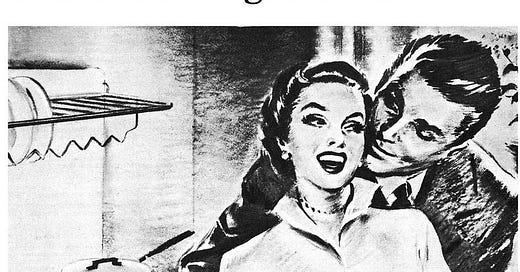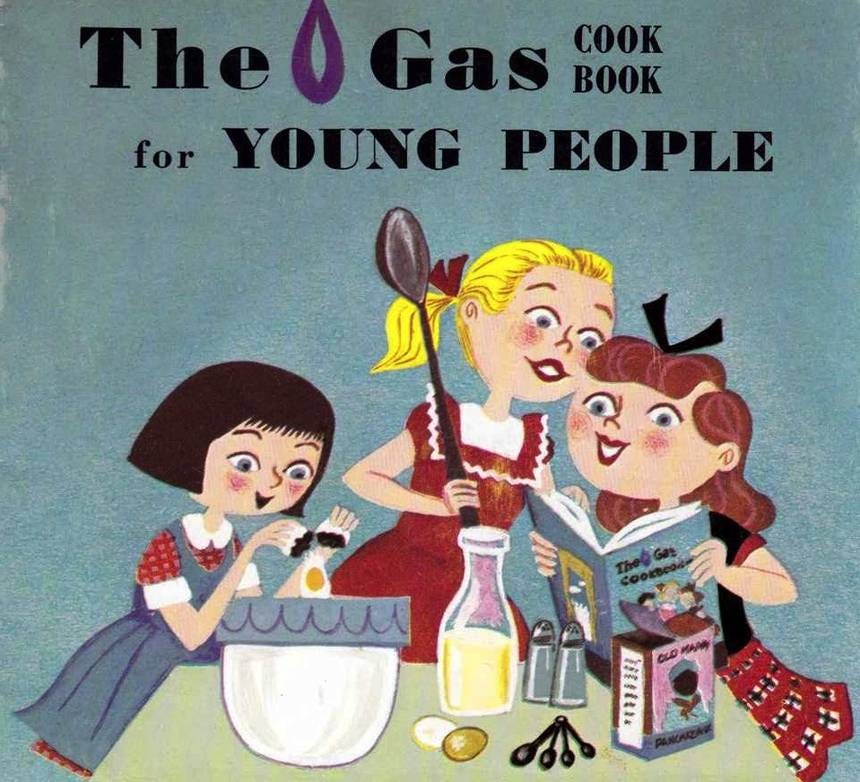Piles of peer reviewed research show how bad cooking with gas is for your health
A bonus from the archives looking at previous research on the dangers of gas stoves.
UPDATE: a lot of links don’t work because they all point to the Internet Archive, which makes them very slow, and often, they don’t load at all. I am trying to fix this; for all of the tweets you can click on the titles or the words WORKING LINK
A recent post, New research shows that gas stoves emit unsafe levels of nitrogen dioxide, drew some comments questioning the statistical basis for the claims made in the study. I thought the commenter made a good point, but I would also note that there is a lot more evidence of the dangers of gas stoves. A few years ago, I wrote a post for Treehugger where I looked at a pile of studies listed in a tweetstorm by Environmental Engineer Shelly L. Miller. It was deleted long ago, but I have reconstructed it from the Internet Archive here. Tweets show up as quotes here, and I cannot promise that every link works.
Cooking with gas has become a controversial subject. For years, serious cooks wouldn't consider anything else; now, many are using induction. In my own home, we have gas [this was written in 2018; we have induction now]. It used to be the greener way to cook when electricity was made with coal, which isn't where I live anymore. (Thanks, Dalton and Kathleen!)
But the other consideration besides carbon emissions is health. I have discussed the issue of products of combustion from burning gas, why good exhaust hoods are important, and why closed kitchens are healthier than open kitchens. But Shelly L. Miller, environmental engineer and Professor of Mechanical Engineering at the University of Colorado Boulder, recently launched a barrage of tweets linking to research into the effects of gas on indoor air quality; she claims that she "just got annoyed when asked if there was evidence of health effects from gas stoves..." Seriously, anyone who reads this will want to rip out their gas range.
Here are a few of the tweets, with excerpts from the studies and abstracts, which I have edited for easier reading and brevity.
From the #SixCities study: strong evidence for causal effect of 2ndhand smoke on increased respiratory illness and exposure to gas stoves associated with reduced pulmonary function - all in children. WORKING LINK
— Shelly L Miller (@ShellyMBoulder) August 8, 2018
Passive Smoking, Gas Cooking, and Respiratory Health of Children Living in Six Cities
This older (1982) study found that second-hand smoke was a lot worse than cooking with gas, but "They also suggest that exposure to gas stoves may be associated with reduced pulmonary function but do not show increases in respiratory illness among children exposed to gas stoves."
Laclede gas/Promo image
Respiratory symptoms were more common in children exposed to a gas stove. "Respiratory Symptoms in Children and Indoor Exposure to Nitrogen Dioxide and Gas Stoves" | American Journal of Respiratory and Critical Care Medicine
— Shelly L Miller (@ShellyMBoulder) August 8, 2018
Respiratory Symptoms in Children and Indoor Exposure to Nitrogen Dioxide and Gas Stoves
Nitrogen dioxide levels were measured in 80 homes in the Latrobe Valley, Victoria, Australia, using passive samplers. Some 148 children between 7 and 14 yr of age were recruited as study participants, 53 of whom had asthma. Health outcomes for the children were studied using a respiratory questionnaire, skin prick tests, and peak flow measurements.... Gas stove exposure was a significant risk factor for respiratory symptoms even after adjusting for nitrogen dioxide levels, suggesting an additional risk apart from the average nitrogen dioxide exposure associated with gas stove use.
Women who used gas for cooking had increased risk of asthma-like symptoms and had reduced lung function and increased airways obstruction compared to those who did not use gas
— Shelly L Miller (@ShellyMBoulder) August 8, 2018
British Gas Council/Promo image
Association of respiratory symptoms and lung function in young adults with use of domestic gas appliances
Women who reported they mainly used gas for cooking had an increased risk of several asthma-like symptoms during the past 12 months including wheeze and asthma attacks. Women who used a gas stove or had an open gas fire had reduced lung function and increased airways obstruction compared with women who did not. These associations were not observed in men.
Children from households with gas stoves had a greater history of respiratory illness before age 2 and small but significantly lower levels of FEV1 and FVC corrected for height.
— Shelly L Miller (@ShellyMBoulder) August 8, 2018
Respiratory Disease Rates and Pulmonary Function in Children Associated with NO2 Exposure
As part of a long-range, prospective study of the health effects of air pollution, approximately 8,000 children from 6 yrs to 10 yrs of age from 6 communities had questionnaires completed by their parents and had simple spirometry performed in school. Comparisons were made between children living in homes with gas stoves and those living in homes with electric stoves. Children from households with gas stoves had a greater history of respiratory illness before age 2.
In homes using gas stoves, children whose parents reported using ventilation when using the stove had higher lung function and lower odds of asthma, wheeze, bronchitis compared to homes that never used ventilation or did not have ventilation available
— Shelly L Miller (@ShellyMBoulder) August 8, 2018
A cross-sectional study of the association between ventilation of gas stoves and chronic respiratory illness in U.S. children
This study compares the use of an exhaust hood and ventilation over a range to cooing without extra ventilation.
In homes that used gas stoves, children whose parents reported using ventilation when operating their stove had higher lung function and lower odds of asthma, wheeze, and bronchitis compared to homes that never used ventilation or did not have ventilation available after adjusting for other risk factors.
Wolf/ There is no way that range hood is going to anything. /Promo image
This is extraordinary. We have danced around this before; I keep showing this Wolf/ Sub Zero ad, which has the worst of all possible worlds in one gorgeous room: a giant gas range, a tiny hanging hood in a big open kitchen. But it was even worse than I thought.
After scanning this research I can only conclude that gas ranges simply do not belong in our homes, particularly in open kitchens, and should never be used without a properly designed and balanced exhaust system, which is almost impossible to find. And for a modern, well-sealed home with controlled mechanical ventilation, (like a Passive House), just forget about it.
And thank you, Shelly L. Miller!







I appreciate Lloyd's work to try to clarify this issue.
I'm not totally satisfied with, "After scanning this research" as evidence. Some of these links don't take you to the studies, so they are effectively voided because the reader can't check them. One of the links that did work, to a Lancet article, states, "other studies have found no such association" of gas stoves with respiratory issues. The older study states that their data "suggest that exposure to gas stoves may be associated with reduced pulmonary function but do not show increases in respiratory illness among children exposed to gas stoves. Understanding of the health effects of these indoor pollutants will be improved by studies quantifying individual exposure to...gas stove combustion products."
It would be useful to find studies that quantify the relative risks, and also studies that show causation rather than correlation, and discuss this.
The real estate crunch necessitated my move to my new place. My current landlords installed a gas stove a few years ago, while I tried to persuade them to install an electric one. But they wouldn't do it, due to the added costs of putting in new electric stuff and their preference for gas. I don't think this is a high health risk for me, but I would like to read more studies. I try to ventilate with open windows and I use a pressure cooker that uses a fraction of the usual energy, and I don't use the gas oven that takes a lot of energy. Hopefully I'll be ok.
So when the power goes out (which happens several times in the winter due to winter storms), that sometime lasts for days. We need to break-out the camp stoves or convert to wood for our meals, while we take cold showers and baths? In other words, camp-out in our own house? Can't go to a motel because they have no power either. My family has used gas for generations with no ill effects.
Sorry, but, I'd rather have instant on gas stoves and water heater than that.
And do not forget about people with gas wells on their property, while the income is not much, most of them have contracts which include unlimited gas usage, which is used for power also.
Another thing to consider, which is far-looking and won't make sense to some, is that if states outlaw gas appliances in the house, pretty soon they will eventually outlaw outside gas appliances also, because of environmental concerns... Also, when gas goes, so goes wood....
This is an area where the govt. should keep their noses out, and let the consumers buy whatever the consumer demands, at least till the infrastructure is improved to where there is 100 percent cheap power 100 percent of the time.